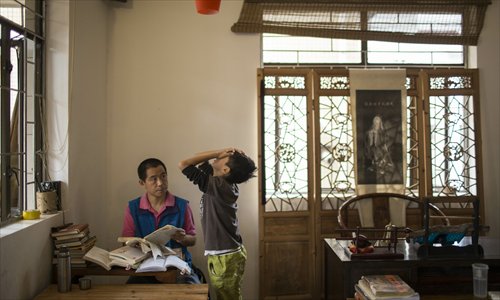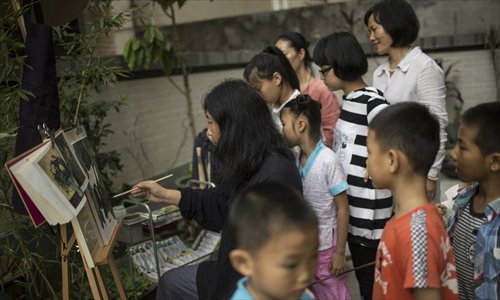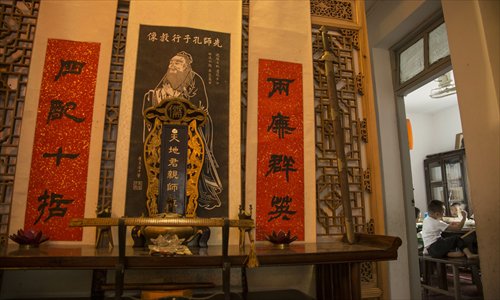Teaching traditions

Many parents believe that a traditional Chinese education is vital for their kids' futures. The involvement of parents helps the children make the most of their lessons. Photo: Feng Haiyong
Wutongshan Mountain is the highest mountain in Shenzhen, South China's Guangdong Province. Over the last decade, old-style traditional schools have quietly reemerged on the slopes of this mountain. Parents who have lost confidence in the country's modern education system are eager to send their kids to the these schools. There are now more than 40 such schools in the area, making it a local education hub.
In China's traditional education system, reciting classic texts was a cornerstone of the instruction of children. Over a decade ago, this practice reemerged and by 2005 more than one thousand students were learning through these methods in Wutongshan's schools. It still remains a niche style of school, but more and more parents are considering whether or not this kind of education is right for their children.
Ten years ago, Zhang Zhonghe founded the De Qian School to teach the classics. Every day he helps his students recite The Analects of Confucius. He says that the text helps youngsters become more diligent and respectful. Painting and music are also key parts of the curriculum, as they once were in all private schools. The teachers encourage parents to get involved in the classes, as it helps the children be more positive about their lessons.
"Parents must study with their kids together here, it creates an environment of learning. However, many parents are now just interested in making money, they are not willing to accompany their kids," Zhang said.
It is believed by the founders of such schools that reciting classics is the best way of learning about them, even though learners often cannot comprehend the words while young.
However, the certificates issued by these private schools are not recognized by the authorities. This discourages many parents, but some are convinced of the value of a traditional education. " I won't send my son to modern schools. The best time for reciting classics are before they are 13 years old. Once my son can recite these scriptures, he will utilize them in the future," a mother said. Despite funding problems, teachers and parents are optimistic about the future of these schools. They say that the promotion of traditional values is highly regarded by central and local governments, who see these schools as keeping alive part of China's cultural inheritance.
Global Times

A student recites The Analects. Recitation is a key part of traditional Chinese education. Photo: Feng Haiyong

Students learn many different subjects at the traditional schools. All students are required to learn how to do housework. Photo: Feng Haiyong

Students attend a painting class. Photo: Feng Haiyong

The promotion of traditional values is highly regarded by the government, teachers and parents. These schools help keep China's cultural inheritance alive. Photo: Feng Haiyong